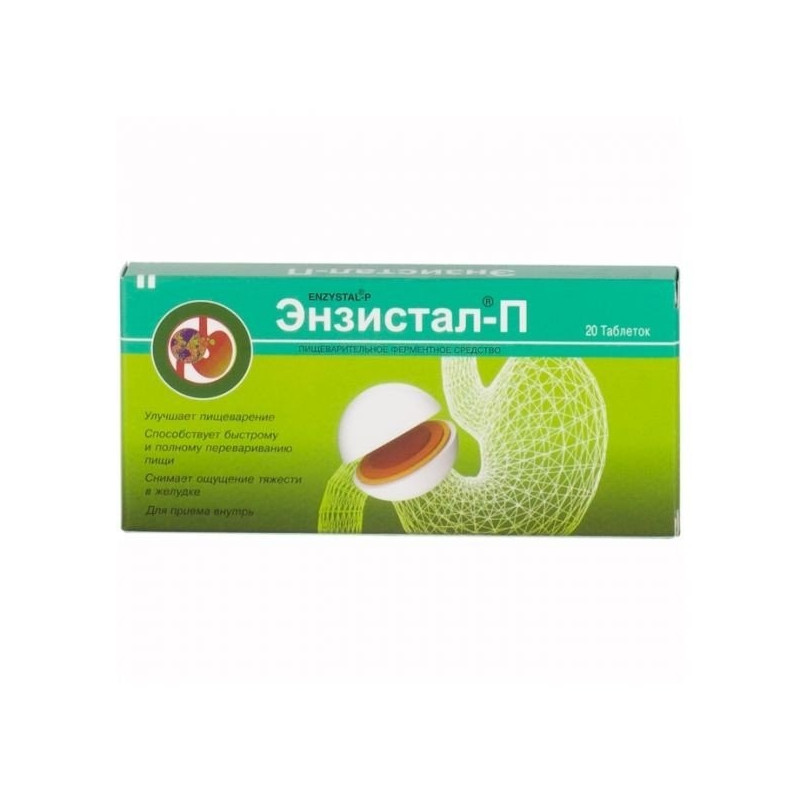



 All payments are encrypted via SSL
All payments are encrypted via SSL
 Full Refund if you haven't received your order
Full Refund if you haven't received your order
1 enteric coated pill contains:
active ingredient: Pancreatin 116.17 mg
Enzistal-P - enzyme agent. Contains pancreatic enzymes - amylase, lipase and proteases, which facilitate the digestion of carbohydrates, fats and proteins, which contributes to their more complete absorption in the small intestine. In diseases of the pancreas, it compensates for the insufficiency of its exocrine function and contributes to the improvement of the digestive process.
The safety of using pancreatin during pregnancy has not been studied enough. Application is possible in cases where the expected benefit to the mother outweighs the potential risk to the fetus.
In experimental studies found that pancreatin has no teratogenic effect.
The use is possible according to the dosing regimen. With a high activity of lipase contained in pancreatin, increases the likelihood of developing constipation in children.
Acute pancreatitis, hypersensitivity to pancreatin.
When used in moderate therapeutic doses, side effects are observed in less than 1%.
On the part of the digestive system: in some cases - diarrhea, constipation, feeling of discomfort in the stomach, nausea. The causal relationship between the development of these reactions and the action of pancreatin has not been established, sinceThese phenomena are related to symptoms of exocrine pancreatic insufficiency.
Allergic reactions: in some cases - skin manifestations.
On the part of metabolism: with prolonged use in high doses, hyperuricosuria may develop, in excessively high doses, an increase in plasma uric acid levels.
Other: when using pancreatin in high doses in children, perianal irritation may occur.
When used simultaneously with antacids containing Calcium carbonate and / or Magnesium hydroxide, it is possible to reduce the effectiveness of pancreatin.
With simultaneous use, it is theoretically possible to reduce the clinical efficacy of acarbose.
With the simultaneous use of iron preparations may decrease the absorption of iron.
The dose (in terms of lipase) depends on the age and degree of pancreatic function insufficiency. The average dose for adults - 150 000 IU / day. With complete insufficiency of the excretory function of the pancreas - 400 000 IU / day, which corresponds to the daily needs of an adult in lipase.
The maximum daily dose is 15,000 U / kg.
Children under the age of 1.5 years - 50 000 IU / day; over 1.5 years old - 100,000 U / day.
The duration of treatment can vary from several days (in case of disturbance of the digestive process due to errors in the diet) to several months and even years (if necessary, constant replacement therapy).
Not recommended for use in the acute phase of chronic pancreatitis.
In cystic fibrosis, the dose should be adequate to the amount of enzymes that are necessary for the absorption of fat, taking into account the quality and quantity of food consumed.
In cystic fibrosis, the use of pancreatin in doses of more than 10,000 U / kg / day (in terms of lipase) is not recommended due to the increased risk of stricture development (fibrous colonopathy) in the ileocecal region and in the ascending colon.
With a high activity of lipase contained in pancreatin, increases the likelihood of developing constipation in children. Increasing the dose of pancreatin in this category of patients should be carried out gradually.
Violations of the digestive system can occur in patients with hypersensitivity to pancreatin, or in patients with meconium ileus or a bowel resection in history.
Enteric-Coated Tablets
At a temperature not higher than 25 ° C
